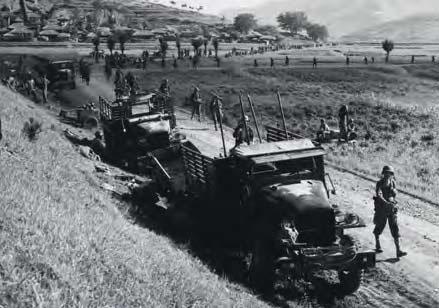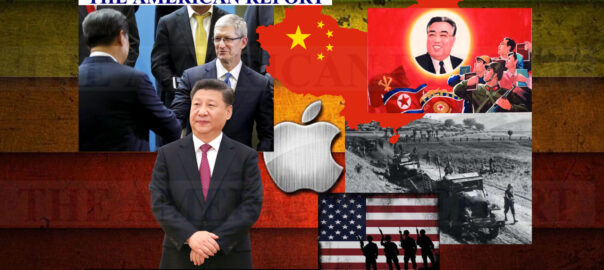By Mary Fanning and Alan Jones | December 6, 2022
Apple CEO Tim Cook is protecting the Chinese Communist Party that killed as many U.S. troops as possible during the Korean War, where Tim Cook’s father was a U.S. soldier on the American side during the bloody war against the CCP and North Korean troops.
Tim Cook appears to have no problem collaborating with the CCP that wanted Cook’s own father, an Army supply clerk, and all other U.S. troops serving on the Korean Peninsula, killed.
Tim Cook and Apple are currently collaborating with their CCP comrades to suppress protests against dictator Xi Jinping and Jinping’s brutal ‘Zero Covid’ policies in China.
Apple CEO Tim Cook Is The “middle child of a Korean War veteran”
“Timothy Donald Cook grew up in Robertsdale, a farming community located roughly halfway between Mobile, Alabama and Pensacola, Florida, the middle child of a Korean War veteran and a pharmacist’s assistant,” Quillette wrote its book review of “‘After Steve: How Apple Became a Trillion-Dollar Company and Lost Its Soul,’ by Tripp Mickle (Morrow/HarperCollins, 2022).”
Apple CEO Tim Cook’s Father Was Drafted And Served In Korean War

Deuce-And-A-Half Trucks, Naktong River, Korean War
According to a profile of Tim Cook’s father titled “Living The Good Life,” published by Gulf Coast Media on July 13, 2018:
“My middle name is Dozier, my father’s middle name was Dozier and my grandfather’s middle name was Dozier,” he said. “I used to get teased about that, but I’m proud of my name and where I’m from.”
In 1952, he got a job at the Alabama Dry Docks in Mobile and shortly thereafter he was drafted into the U.S. Army. He went through basic training at Fort Jackson, South Carolina, before shipping out from Camp Pendleton in California to serve in the Korean Conflict.
“Serving in the Army turned out to be the best thing that ever happened to me,” he [Donald Cook] said. “I learned a lot in Korea that stuck with me for the rest of my life.”
Cook said he missed seeing any heavy fighting during his tour of duty. He got what he called “the best job in the Army,” serving as a parts supply clerk for 2 ½ ton military cargo vehicles known as “deuce and a half’s.”
“We had 67 vehicles total in our Company,” he said. “My job was to make sure they had the parts they needed. They gave me a Jeep to drive around in and I had everything I could want.”
Cook said the living conditions were primitive. He lived in quad tents that were little more than a tent with just a sleeping bag between him and the floor. He and his fellow soldiers lived without a phone, electricity or running water.
“I grew up in the country,” he said. “I didn’t mind it as much as some of the other guys…
…In all, Cook spent 18 months in South Korea, starting out as a private, eventually rising to the rank of corporal.
“It took me 14 months to go from private first class to corporal,” he said. “They wanted me to go another six months and if I had I would have made sergeant, but all I wanted to do was go home.”
Tim Cook’s Mother, Wife Of Donald Dozier Cook, US Army Corporal, Korea, Buried At Veterans Memorial Cemetery In Alabama
Alabama State Veterans Memorial Cemetery at Spanish Fort Records
Spanish Fort, Baldwin County, Alabama
Cook, Geraldine Majors, b. 11/08/1937, d. 04/29/2015, Section 1, Site 76, Wife of Donald Dozier Cook, US ARMY, CPL, KOREA
Chinese Communist Troops Brutally And Repeatedly Attacked US Troops During The Korean War
According to the official United States Army website:
The Korean War was the first major armed clash between Free World and Communist forces, as the so-called Cold War turned hot…
…The Battles Along the Ch’ongch’on
On the night of 25 November the Chinese struck Eighth Army again. The first CCF attacks hit the 9th and 38th Infantries of the U.S. 2d Infantry Division about eighteen miles northeast of Kunu-ri along the Ch’ongch’on River. Charging to the sounds of bugles, the Chinese 40th Army found gaps between the units and struck their flanks. They hit units on both sides of the river just south of a low mountain called, ironically, Chinaman’s Hat. Infiltrators also attacked elements of the 23d Infantry just behind the 9th Infantry. The Chinese took heavy casualties and were forced to suspend their attack in the early morning hours, only to resume just before dawn. Vigorous U.S. counterattacks restored most of the main line positions. Attacks also were pressed against the U.S. 25th Infantry Division to the 2d Division’s left, prompting a now-alerted U.S. command to cancel the advance planned for 26 November. Suddenly on the defensive, U.S. soldiers dug in and consolidated their positions while waiting for new Chinese attacks.
COPYRIGHT 2022 MARY FANNING AND ALAN JONES
